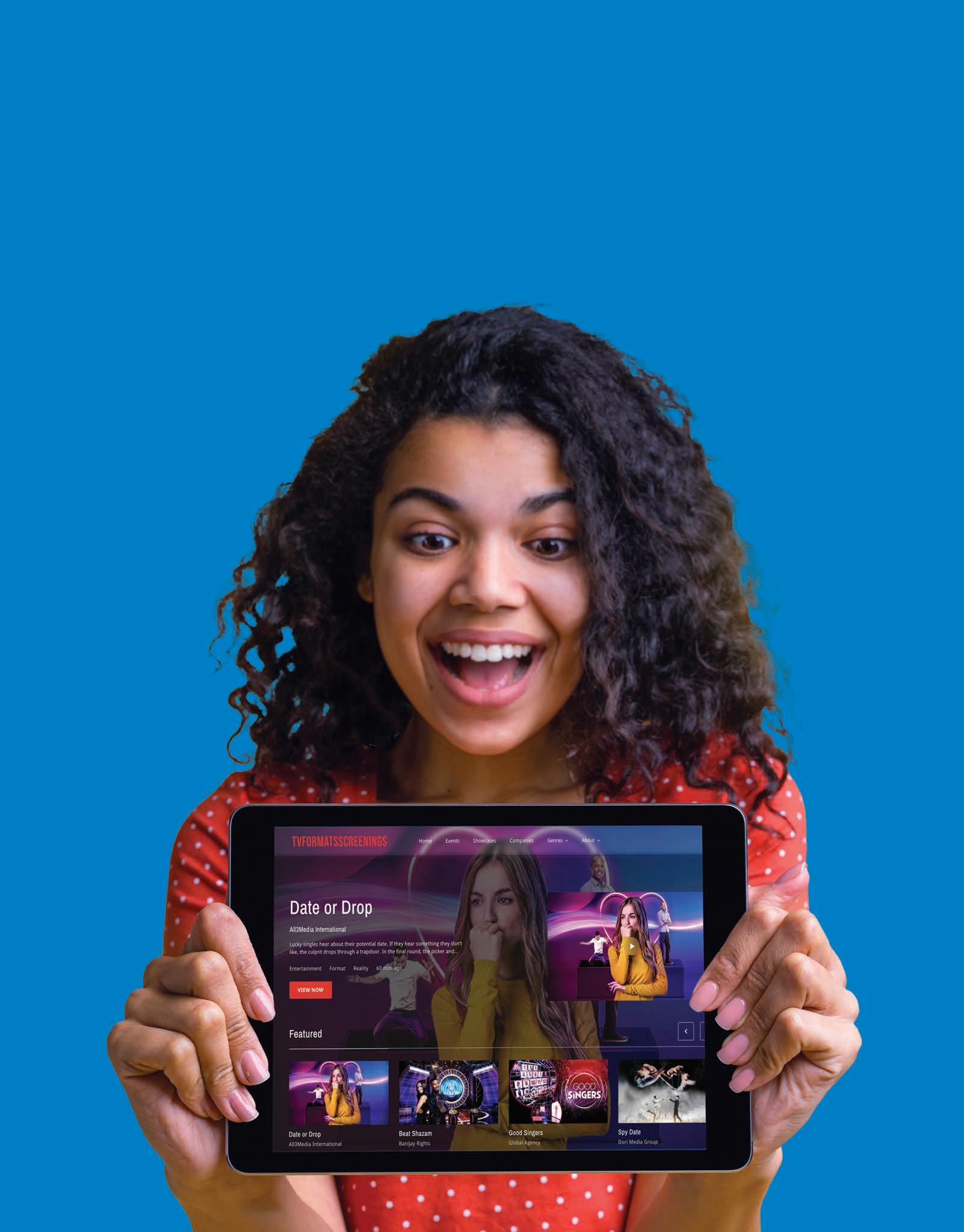TVFORMATS











Broadcast TV usage in the U.S. saw an uptick in August for the first time since January. Per Nielsen’s The Gauge, broadcast viewing rose by 1.6 percent month-on-month to reach a share of 20.4 percent, driven in part by brands like America ’s Got Talent and Big Brother.
Further proof that live television still matters even outside the core realms of news and sports? Live TV is still the most common starting point for viewers, according to a study from Hub Entertainment Research: 46 percent of consumers start on live TV, with SVOD at 45 percent.
And then there’s the FAST space—look at the engagement on channels for Survivor, Got Talent, Wheel of Fortune and other behemoth reality, talent competition and game-show brands that have enough volume to sustain 24-hour services. If you have a library of an older but beloved brand, you could even use a single-IP channel to explore reboot potential while making revenues off of hours of content that you perhaps haven’t monetized in years.
Of course, for that you need to have a library, and sustaining an entertainment format season after season takes a lot of time and effort. Rob Wade, CEO of FOX Entertainment, knows a thing or two about franchise management; he oversaw flagships like MasterChef and The Masked Singer in his previous post overseeing alternative entertainment at FOX. In our Q&A with him in this issue, he talked about the strategies that have worked for FOX and how FOX Alternative Entertainment is seeking breakout new concepts that can be cost-effectively produced and easily replicated in multiple markets.
A veteran of the formats business, FOX Entertainment CEO Rob Wade shares his thoughts on taking big swings and franchise management.

Leading distributors offer up their perspectives on how to win in the competitive game-show formats space, including amping up viewer interactivity.

Adaptability and scalability are the hallmarks of any good format, but especially crucial in the game-show arena. As broadcasters look for ways to cut costs but still lure audiences, prime-time game shows remain in high demand, but you do need something special to break through the clutter. Hybrid elements—fusing game shows with other genres—help, and having some level of play-at-home engagement is key. But as Wade told me, you do also have to think about the long tail: “As a broadcaster, we believe in the power of urgency, bringing people into the big tent while simultaneously making sure the shows we buy have that ability to be consumed in a way that some viewers prefer, i.e., when they want and how they want it. You have to think about how you serve both.”
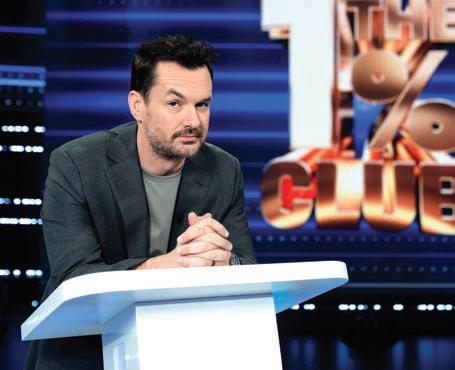
Whether you’re in need of an out-of-the-box game show, heartwarming factual entertainment or even a gripping scripted format, our latest TV Formats Screenings Festival has you covered.
REACHING 22,000 EXECUTIVES EVERY MONDAY SUBSCRIBE HERE: SUBSCRIPTIONS.WS

The 1% Club / Lost Dogs: Live / Bridge of Lies
BBC Studios is bringing the prime-time entertainment show The 1% Club live to the Hi5 Studio in Cannes, where MIPCOM attendees can participate in the international hit. In the series, the host engages contestants with logicbased questions that ultimately reveal whether they have what it takes to join the exclusive 1% Club. “ The 1% Club has already proven to be a hit with buyers,” says Matt Forde, managing director of global entertainment. Also on the format slate, Lost Dogs: Live calls upon the public to help reunite missing dogs with their devastated owners. Bridge of Lies sees teams of contestants competing for cash by crossing a bridge on the studio floor, stepping on the truths and avoiding the lies within the time limit.
Snake Oil / Next Level Chef
In the game show Snake Oil, on offer from FOX Entertainment Global, contestants present unique products to convincing entrepreneurs, some of whom are real while others are “snake oil salesmen.” With the help of guest celebrity advisers, contestants must determine which products are real and which are a sham for a chance to win life-changing money. The series on FOX in the U.S. is hosted and produced by David Spade (SNL, Just Shoot Me) and executive produced by Will Arnett (LEGO Masters, Arrested Development) through his Electric Avenue Productions. In Next Level Chef, another FOX Entertainment Global highlight, chefs Gordon Ramsay, Nyesha Arrington and Richard Blais recruit chefs as they face cooking challenges with the goal of finding the food world’s newest superstar.

Global Agency is highlighting three studio-based entertainment formats at MIPCOM: a game show, a cooking competition and a shiny-floor singing series. Match the Family challenges contestants to identify family members of a person in the studio. “The global resonance of the format is rooted in its central theme: family,” says Izzet Pinto, founder and CEO. The cooking show The Rolling Kitchen features a competition set within a rotating kitchen. “Couples need to read each other’s minds and estimate the cooking procedure in order to win,” Pinto says. Blind Duets brings together four celebrity singers in a jury and contestants to perform for them, though their identities are concealed by cabinets. “Blind Duets stands out from other singing contests by tapping into the talent of its jury members as performers,” says Pinto.


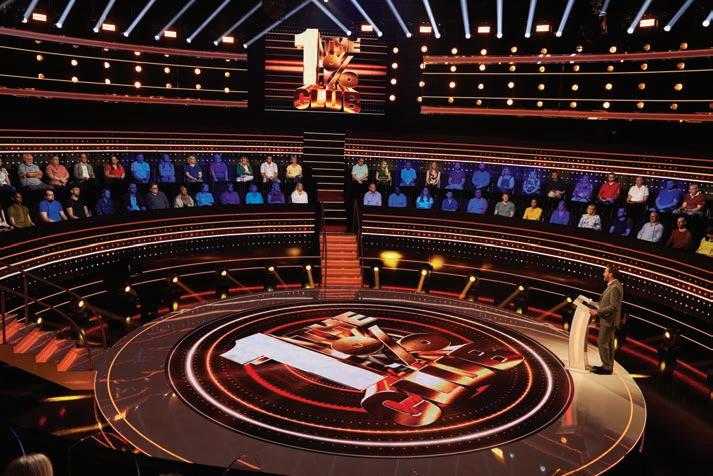

“Our MIPCOM slate this year perfectly demonstrates BBC Studios’ range and versatility of format titles.”
—Matt Forde
“The pandemic has inevitably led to an increase in the search for entertainment formats in the TV industry.”
—Izzet PintoNext Level Chef The 1% Club

Mirror Island / Love Maze / Who Are You Now?
The competitive social experiment Mirror Island is a featured title from Media Ranch’s MIPCOM roster. Dividing identical twins into two separate houses, the show implements one crucial difference in gameplay that sparks a web of differing social dynamics. Love Maze centers on singles looking for love, having them navigate a real maze to reach their potential mates. With many temptations hiding behind every corner, the participants either get lost or find their partner. Dating games such as this are “always of interest to audiences around the world who are seeking a special relationship,” says Philip Kalin-Hajdu, director of storytelling and business development. Who Are You Now? features celebrities who discover that they are related to some of history’s most famous and infamous figures.

Suspects on the Set / 5 Friends, 5 Favours!
Nippon TV’s Suspects on the Set is a murder mystery game show with a mix of scripted crime-drama elements. Set at the scene of a murder, actors each play a role and must improvise until the culprit is revealed. The studio game show 5 Friends, 5 Favours! sees friends battle it out to win for their celebrity pals. The keys to unlocking victory lie in who they know and their rich social connections. “We are actively pursuing codevelopment and co-production partnerships and hoping to announce a new original unscripted format, codeveloped and co-produced with a global partner,” says Tom Miyauchi, head of formats at Nippon TV’s global business unit. “It will first be produced and broadcast in Japan on Nippon TV as a pilot version for international markets.”
Suspects on the Set

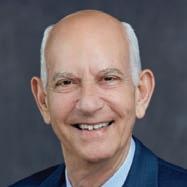


The classic game show Wheel of Fortune, on offer from Paramount Global Content Distribution, ranks as the second highest-rated series in U.S. syndication, reaching more than 9 million viewers nightly. “Wheel of Fortune is classic, iconic, current and hugely successful,” says Paul Gilbert, senior VP of international formats. “We currently have it optioned or licensed in more than 20 countries. Not bad for a 42-year-old show that just never stops giving.” There’s also Pictionary, based on the classic board game. “In today’s environment of smaller production budgets, it’s an extremely low-cost production, with as many as seven episodes recorded in a day,” Gilbert says. The hoax reality series The Joe Schmo Show is returning in 2024. The show originally debuted in 2003 and “quickly became a cult classic,” says Gilbert.
Pictionary

“We are meeting with partners and producers to source the best new formats for our portfolio.”
—Philip Kalin-Hajdu
“Pictionary is family viewing at its finest.”
—Paul GilbertMirror Island
“Our creative team wanted to ensure that we created new programs that were cutting-edge and unique, with captivating stories that will resonate with global audiences.”
—Tom Miyauchi
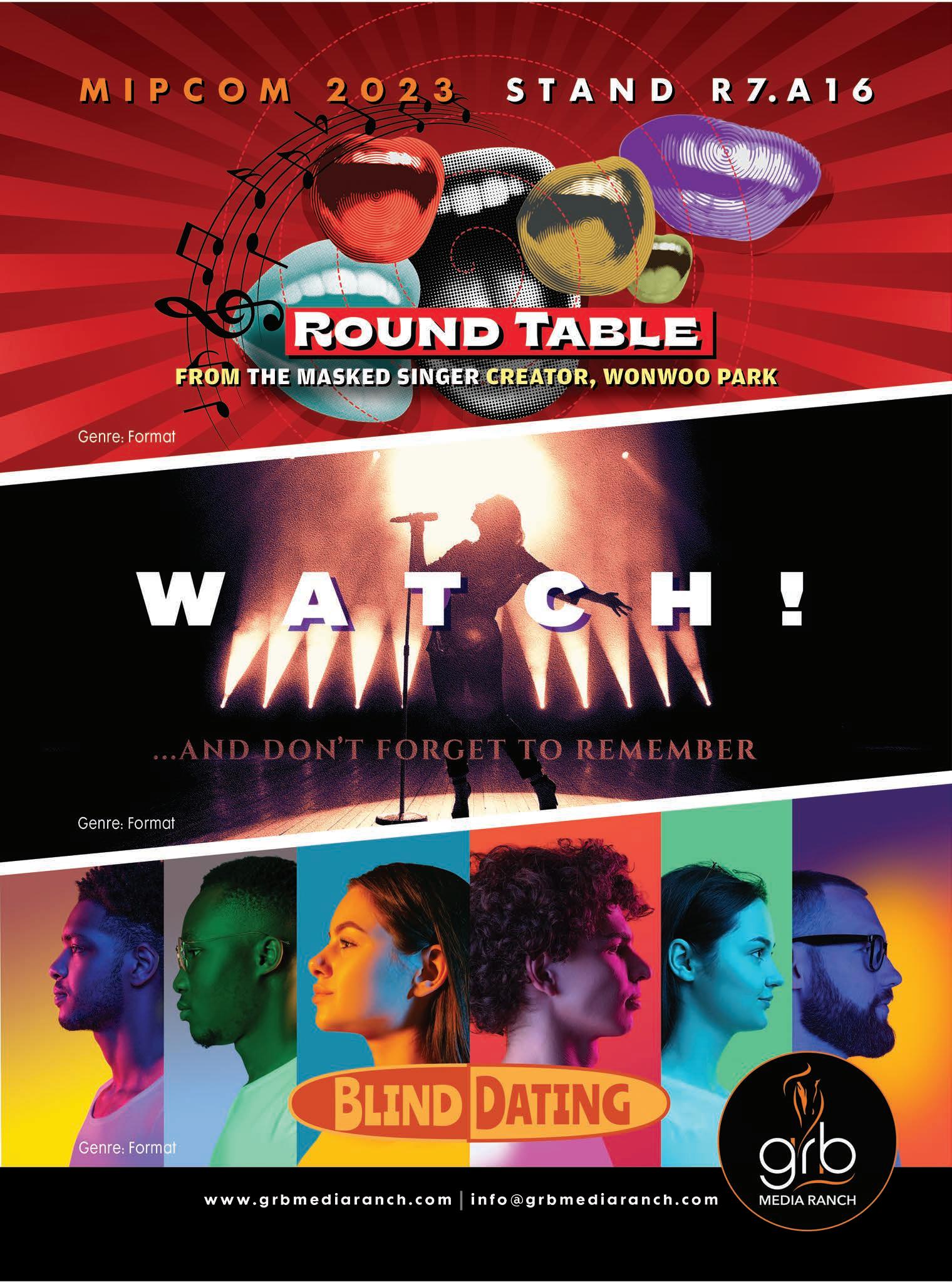
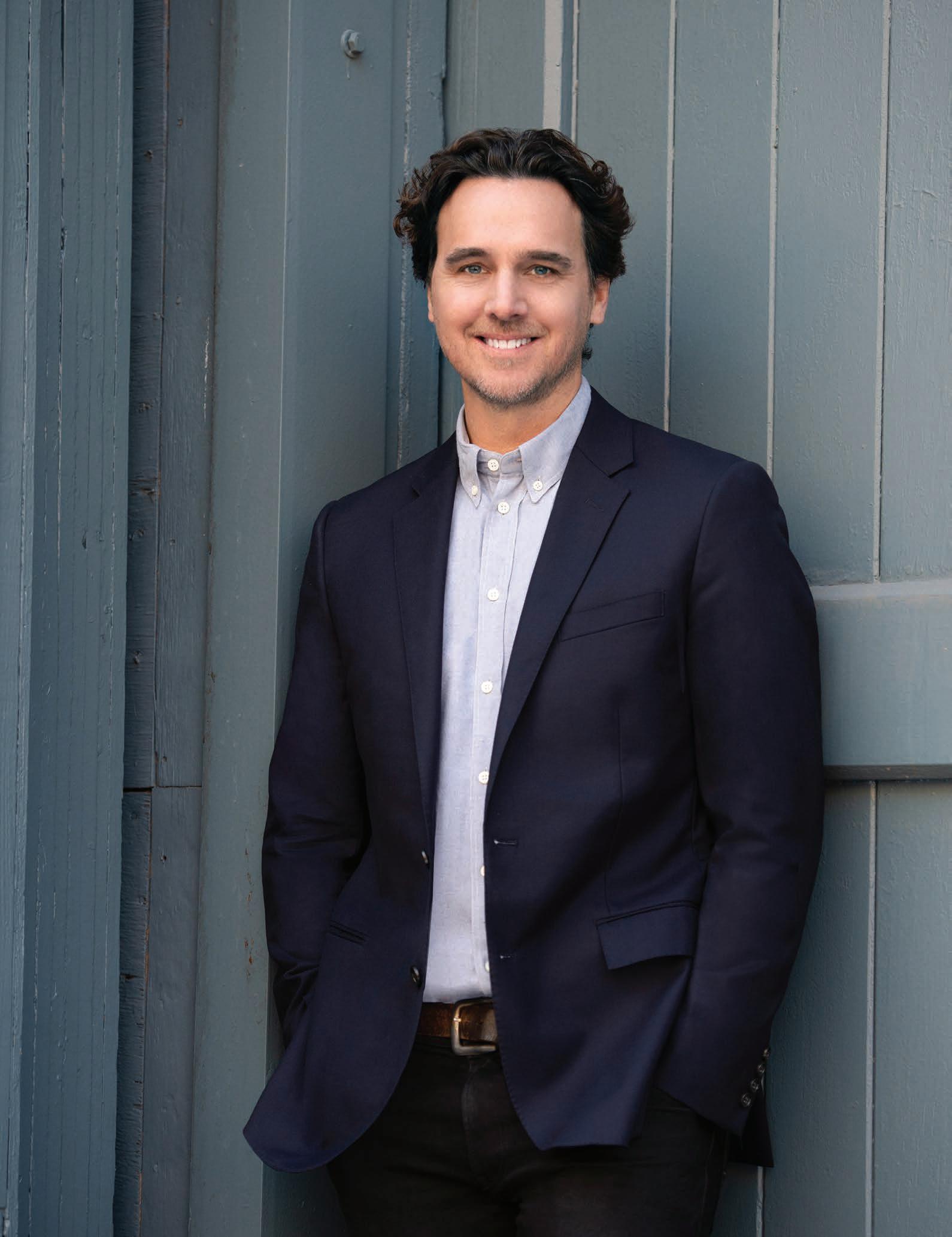
During his tenure heading up alternative programming at FOX—including the launch of its successful non-scripted studio, FOX Alternative Entertainment (FAE)—Rob Wade has overseen the rollout of some of the format business’s biggest hits. He helped place the quirky Korean singing talent show The Masked Singer on the global map, extended Gordon Ramsay’s powerhouse presence on the FOX network and pioneered a new approach to spotting up-andcoming ideas via a $100 million International Format Fund. For the last year, Wade has been CEO of FOX Entertainment, and his extensive non-scripted expertise is certainly coming in handy as he programs a broadcast network amid a strikeimpacted fall season. Wade talks to TV Formats about franchise management and championing breakout concepts.
TV FORMATS: FOX has been quite the game-changer in the non-scripted formats space. Let’s start with your iconic returning brands like The Masked Singer . What’s the approach to franchise management and keeping them fresh?
WADE: It’s a testament to the quality of the network executives and the producers involved. They are challenged every time to come up with new ideas. The pitfall you can encounter as an executive and a production company is to say, let’s do another season! We say, we can do another season, but what is that season? Let’s talk about that first. It’s almost a pain point for people to break through. We’re not going to greenlight this until you come up with the idea. That produced the latest MasterChef season, in which regions of America compete against each other. You’ll see it in the newest season of The Masked Singer with theme nights and the overall creative structure of the format. They are continuously striving to improve and are not resting on their laurels. It requires an investment of time, sometimes an investment of money. But if the idea is right, it’s worth it because you need to sustain these returning formats; they are precious.
TV FORMATS: Tell us about the approach you’re deploying at FAE, from scouting for ideas internationally to developing new concepts in-house.
WADE: It’s a combination of everything. We are making a lot of headway in creating successful business models and price structures. From a creative point of view, unscripted needs fresh and new ideas and bigger swings. I’ve been saying this for a few years now; it’s a mature business. You can’t get away with new ideas inspired by old ones; you need true freshness. We do various things as a catalyst to solve this. One is the International Format Fund, which
By Mansha Daswaniencourages some of the countries that are ambitious in their ideas, but because of the size of the market, they don’t have the financial ability to take big swings. We’re offering them support to take the big swing in return for participation in the format and the ability to make the show in the U.S. The other huge thing is that more entertainment viewing is being transferred away from day and date, so there’s a long tail with these shows, in-season and out-of-season. As a broadcaster, we believe in the power of urgency, bringing people into the big tent while simultaneously making sure the shows we buy have that ability to be consumed in a way that some viewers prefer, i.e., when they want and how they want it. You have to think about how you serve both.
TV FORMATS: You’ve been in business with Gordon Ramsay for a while. Why was expanding that relationship further via the Studio Ramsay Global joint venture important?
WADE: Gordon’s been an important part of FOX for the last two decades. FOX and Gordon Ramsay are synonymous with each other. He is what I would call a sexy rebel! He’s not your typical hero; he’s a bit of an antihero who fits our brand in so many ways. What’s attractive about that whole venture now is all the linear business with Next Level Chef and Gordon Ramsay’s Food Stars, and the continuing success of the MasterChef and Hell’s Kitchen franchises and now Kitchen Nightmares . What’s also exciting for us is Gordon has over 100 million social media followers. We see real potential to build new ventures and franchises outside the linear television ecosystem. Over the next 12 months, you will see a lot more announcements on that in the digital and product spaces. It will show everyone a blueprint for the future of how we should be looking at content.
Whether you’re in need of an out-of-the-box game show, heartwarming factual entertainment or even a gripping scripted format, our latest TV Formats Screenings Festival has you covered, spotlighting new and returning properties from across the globe.
Four long-r unning European hits are being made available for adaptation by international broadcasters and platforms via ZDF Studios, including the beloved entertainment show Wanna Bet? , which fuses talk, game and variety elements. “In this show, nothing is pre-recorded or edited,” says Ralf Rückauer, VP Unscripted. “If the celebrities lose their bet, they must complete a task of their own, most often an entertaining charitable gesture. Airing since 1981, Wanna Bet? is the absolute top entertainment show in the Germanspeaking territories and a hit around the world.” QUIZ HUNT , meanwhile, has shown consistent ratings growth in its home market. “The
 ZDF Studios’ Wanna Bet?
ZDF Studios’ Wanna Bet?
market share in this time slot has almost quadrupled, and subsequent time slots benefit from this rapid growth,” Rückauer notes. ZDF Studios has another quiz show on offer, the beloved Dalli Dalli , along with the factual offering Crime Watch XY . “
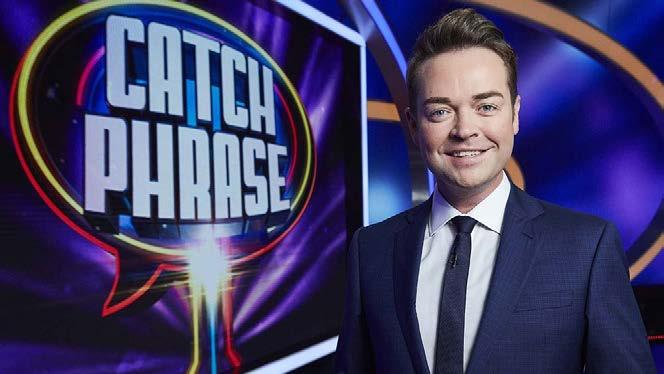
Crime Watch XY is one of the most successful TV formats on German television and was the first reality show in the world,” Rückauer says of the format, which enlists audience help in tracking down fugitives.
All3Media International has a selection spanning all the key categories in the formats space, including a range of buzzy game shows. There’s Head to Head , which originated in Sweden and has already been adapted in four markets; Catch Phrase, created by Pasetta Productions and Steven Radosh; and the brand-new Picture Slam from Objective Media’s Triple Brew. “Easy to play, hard to win,” says Nick Smith, executive VP of formats, about Picture Slam , which launched on BBC One in the U.K. “This is the game where you need to know something about everything. Now more than ever, we are bombarded with pictures and images, making this addictive new prime-time quiz incredibly timely. Easy to play along at home, it will have viewers hooked to the TV and laughing from start to finish.” On the factual-entertainment front, there’s Millionaire Hoarders , in which antiques experts sift through homes seeking valuables; and Teenage Boss . “Audiences in Australia, Mongolia, the Netherlands, Poland and Sweden have been hooked to
 All3Media International’s Catch Phrase
All3Media International’s Catch Phrase
this hugely entertaining format that looks at how teenagers handle money,” says Smith. All3Media International also boasts a slew of scripted formats, among them Liar , which has been successfully translated to over 12 territories, including Italy, Spain, France, India, Turkey, Germany, Greece and Malaysia.

Korean formats continue to make waves across the globe, and one of the buzziest new entries in that space is Something Special’s reality game show Battle in the Box. “Since the news broke in September about UKTV’s commissioning order, which features beloved comic Jimmy Carr, everyone has been eagerly waiting to see it,” says Praise ChanMi Shin, VP and head of sales and licensing. “The show is simple and entertaining,
 ZDF Studios’ Dalli Dalli
ZDF Studios’ Dalli Dalli

appealing to audiences of all ages. Even if you tune in halfway through, you’ll instantly know who’s winning or losing thanks to the centerpiece of the show—a moving wall. Optioned in Germany, with more to come.”
Something Special is also showcasing a mystery-solving reality gameshow concept called Still Alive , which has already been optioned in Italy and is in discussions for a full-season commission in Korea. Also on offer from South Korea are Munhwa Broadcasting Company’s Alumni Lovers and Keep Talking I Love It, while from neighboring Japan, TV Asahi Corporation is rolling out Beat the Champions . The TV Formats Screenings Festival also features Dori Media Group’s Power Couple and The Best of All and Onza Distribution’s The Celeb Challenge.
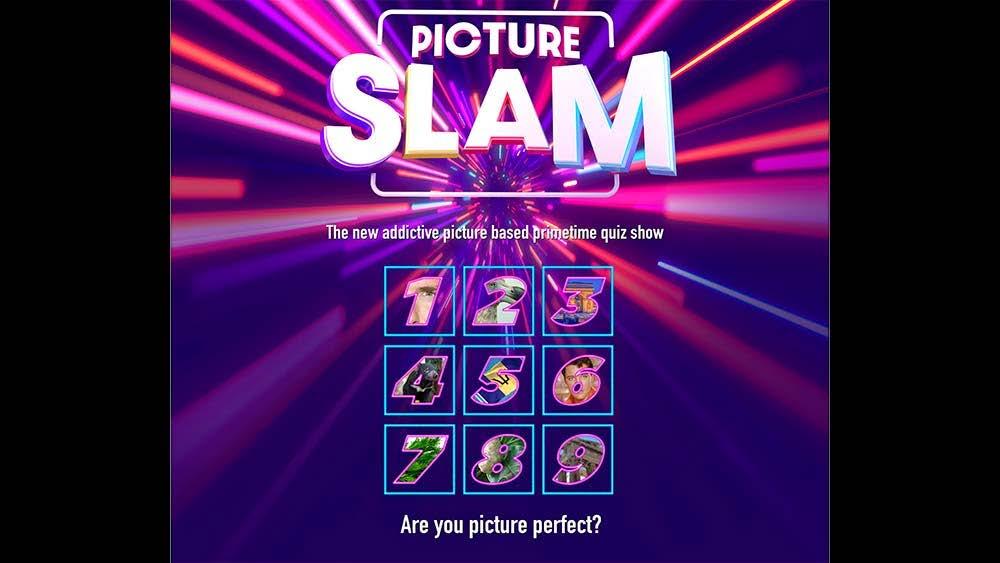

Game shows never go out of style, but making an impact with one amid a sea of options— from the long-running juggernauts to vintage classics being dusted off for a new era to brand-new spins that are tapping into technological advancements to make at-home viewers feel like they are competitors—has never been more challenging.
The good news is that demand is surging; the strikes in Hollywood have left a lot of gaps in broadcast network schedules, so there are several game shows in U.S. prime time again. And the appetite in the rest of the world shows no sign of diminishing.
“Game shows are always in the forefront and always will be,” says Paul Gilbert, senior VP of formats at Paramount Global Content Distribution. “They are less expensive than other forms of programming, and the return can be high. Low cost and high ratings—it doesn’t get any better than that.”
“When I speak to clients around the world, there’s always a feeling that viewers come to game shows,” adds Andre Renaud, senior VP of global format sales at BBC Studios. “Regardless of what’s happening around the world, I don’t see any waning of game shows happening anytime soon in markets where there is already an appetite for them. I am starting to see that markets that don’t necessarily have a traditional appetite for game shows are also considering them. You can film three or four of these in a day.”
Tom Miyauchi, head of formats at Nippon TV’s global business unit, is of a similar perspective, noting: “Our view is that game-show formats are expected to remain resilient during budget constraints and uncertainties in the market due to their cost-effectiveness and trusted outcomes.”
Global Agency is feeling especially bullish about the U.S. at present, looking to land local commissions on The Married Game and Match the Family , according to Izzet Pinto, founder and CEO. “There is a great interest in unscripted from the U.S.,” Pinto observes. “In the next six to 12 months, we will see many formats on the screen.”
The slowdown of scripted, in the U.S. and elsewhere, is goosing demand for game-show formats, concurs Sophie Ferron, co-principal at GRB Media Ranch, the distribution joint venture between GRB Studios and format specialist Media Ranch. “However, game shows usually have hosts— who will not be able to perform” due to the U.S. actors’ strike. “And game shows take a lot of development and expertise to get right. I foresee perhaps a small bump in what we’ll see out there—but not a huge shift.”
As for how to craft the perfect game show, Renaud highlights the importance of having a simple premise that can be easily understood, questions and topics that can be easily localized, and, he says, “make it as visual as possible.”
Ferron also stresses the importance of “solid, simple gameplay,” noting, “If it has that, it is scalable. And
relatability and playability. We all want to spell the word Wheel of Fortune . We all want to guess the song on Beat Shazam. We all want to know if our answers fall in line with the top 100 on Family Feud and to ask what that says about us. Our show Watch! plays on the fact that no matter how enthralling a performance is, we all see things differently, and it’s difficult to remember and describe reality.”
All3Media International is promising easy adaptability for Catch Phrase, the prime-time game show created by Pasetta Productions and Steven Radosh. “Every country has its own iconic catchphrases, and this beloved prime-time hit holds endless global appeal,” says Nick Smith, executive VP of formats at the company.

Meanwhile, BBC Studios’ The 1% Club, a key highlight for MIPCOM, “is not about what you know; it’s just about what you see,” Renaud says.
At Nippon TV, Miyauchi distills the essence of a good game-show format down to three core pillars: universal appeal, scalability and audience engagement.
“First of all, universal appeal is the key—a strong, relatable concept, touching wider audiences while avoiding any cultural
references that may be specific to a country or territory,” he says. Alongside that, he notes, is the need to establish “clear and concise rules and structure for the format to keep consistency and make it easy to replicate across multiple markets.”
Miyauchi explains that scalability is paramount for accommodating different budget levels, and audience interactivity is more important than ever. “By incorporating elements such as guessing and voting that allow for audience participation, it builds a sense of community and engagement around the format.”
Indeed, in surveying leading format sales executives about what’s transforming the game-show sector, it turns out that “interactivity,” while not a new concept, is essential for a successful game-show format today.
BBC Studios is rolling out a play-along app for The 1% Club , a fairly new game-show format that is becoming a significant hit for the company. “The success of The 1% Club keeps growing for us and for Magnum Media,” Renaud explains. “We’re on air in seven countries.”
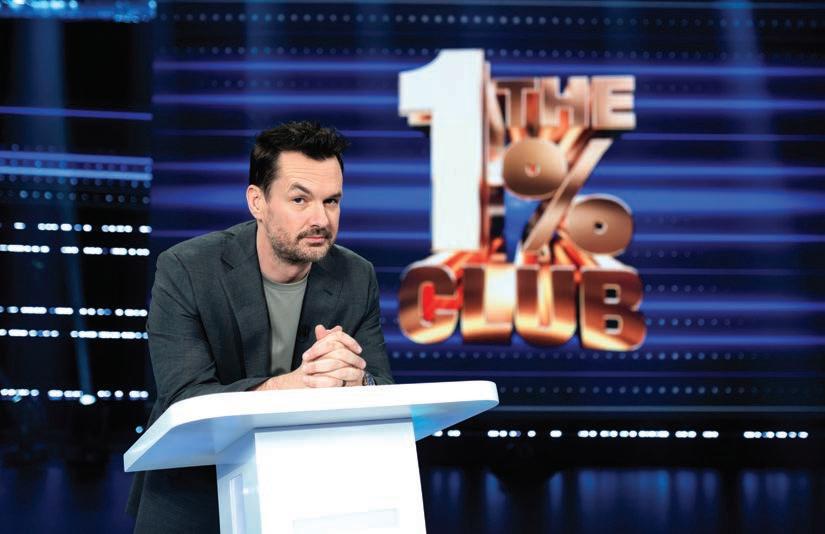
Home play-along is also central to All3Media International’s brand-new Picture Slam , which hails from Objective Media’s Triple Brew. “Easy to play, hard to win,” says Smith. “This is the game where you need to know something about everything. Now more than ever, we are bombarded with pictures and images, making this addictive new primetime quiz timely. Easy to play along at home, it will have viewers hooked to the TV and laughing from start to finish.”
Global Agency’s Pinto observes: “It’s very important to make formats more interactive right now. For example, a board game is on sale for Joker, and we are working on designing a live app for Match the Family.”
GRB Media Ranch’s Ferron has also witnessed new approaches to technology in gameshow formats and points to an emerging interest in hybrids. “For example, our paper format Watch! is a hybrid between variety and quiz;
proven format Round Table is singing meets game strategy; and our Horsepower incubatormade paper format House Party , which is based on the hit game Just Dance, uses stateof-the-art tech developed by Ubisoft to ensure that the TV version has the gameplay recognized by fans of the game.”
BBC Studios’ Renaud also points to the fusing of genres in game-show formats and is of the perspective that “physicality is back, but not necessarily in the way we might think. It’s not necessarily physical game shows but something with movement. While budgets are tight, we’re seeing something else come through: game shows that are not stationary. Moneybags is an example—they’re physically picking up things as they go. Breaking Point , which we had on RTL in Germany, where you’re waiting to see what the breaking point of something is, also has a lot of physicality. And the game within a game, a hybrid with reality, is also picking up interest.”
Nippon TV, too, is plugging hybrids like Suspects on the Set. “The murder mystery game show incorporates elements of scripted drama to heighten the thrill and create unique and engaging experiences across audiences from both genres,” Miyauchi says. “Also, there is sometimes ‘gamification’ in game shows, taking inspiration from video games by incorporating elements such as leveling up, earning life points and clues to unlock stages. Our best example in this genre is Time Potion , a high-concept game show where time is the ultimate ruler and time potion is used as an item to recover time.”
Interactivity and hybrid elements are helping to inject new life into veteran game-show brands, with innovation required season after season to keep audiences engaged.
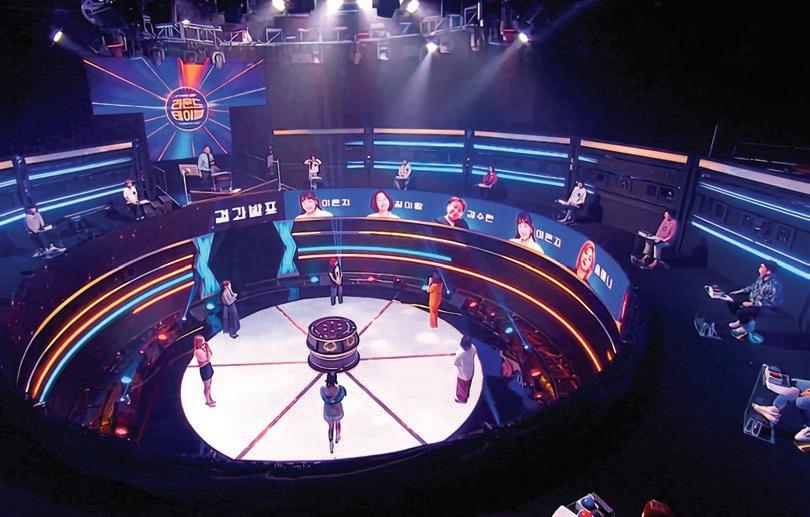
“We work with the right partners as a distributor,” says Global Agency’s Pinto on maintaining the success of a game-show brand. “The local producers in each country are adding new elements or twists to keep the format fresh. As long as the format goes well, every season is better than the previous one, as their budgets increase. That’s why many of our formats have been on air for about ten years, bringing new versions around the world.”
GRB Media Ranch’s Ferron stresses the need to “balance familiarity with freshness. There is a reason people watch, say, Family Feud . We get it, and it has a feeling of nostalgia and comfort. However, it also innovates in terms of the style of questions, the tone, the type of families, enhancing the set, etc. Also, new challenges and twists that feel authentic to the show are important to bring into the mix every so often.”
Looking for a fresh take is especially important when trying to resurrect a classic gameshow brand, observes Renaud: “People are looking
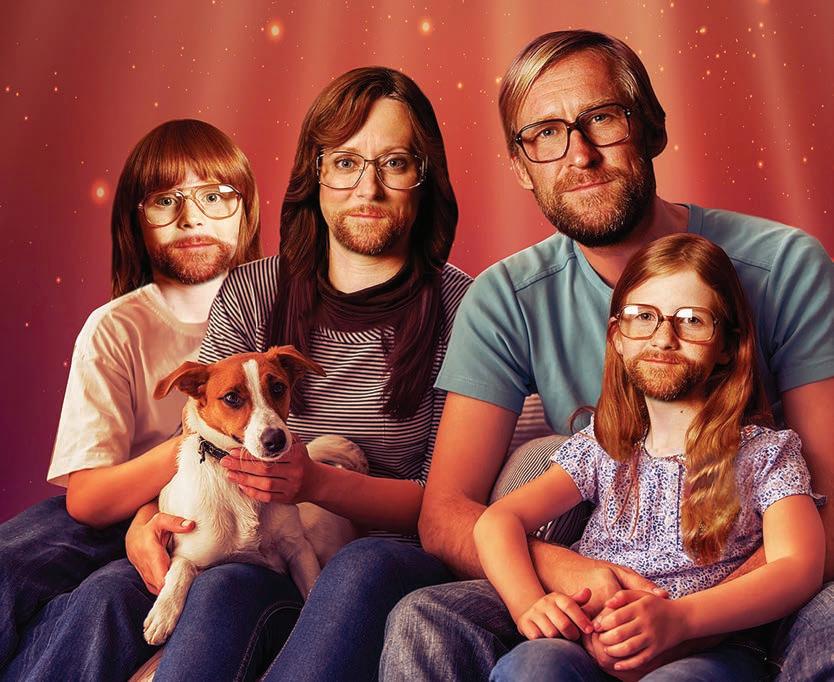
for authenticity and truth in storytelling. That also can go through into a great game show. If I look at Friends Like These, does it have to be gendered groups now? Can it be colleagues? Can it be things that make it a bit more modern and inclusive? If you look at The Weakest Link , the people hosting it now are true comedians. There’s a wink and nudge that makes it feel more inclusive, warmer and less combative.”
Indeed, choosing the right host is key to a game show’s success, Renaud says. “We spend a lot of time on the role of a host in a particular game show. Are they on your side? Are they your enemy? Are they there to create a sense of fun? That’s crucial in finding the talent to allow that to happen and create the atmosphere.”
It’s equally important to choose the right contestants, and that differs depending on the nature of the show, according to Paramount’s Gilbert. “ Jeopardy! is a very intellectual show that requires very smart contestants. Wheel of Fortune,
on the other hand, looks for contestants who are outgoing and can solve the puzzles.”
“We work with the best casting directors in each country,” says Pinto at Global Agency. “We discover colorful characters for TV, and those characters even go viral on TV.”
Nippon TV is bringing Masquerade back to Japanese viewers for the first time since the pandemic, with a special 99th episode planned for the show, which has been on the air since 1979. “One major point when we plan the show lies in the detailed meetings with the contestants so that the performances will be stronger and the talents are diverse, ensuring that the viewers’ experiences are more engaging than ever,” Miyauchi explains. “It is very difficult to ‘better’ the show each time, but our dedication casts a good vibe to the contestants and creates miraculous performances, leading to great results in ratings and views.”
GRB Media Ranch’s Ferron distills her approach to casting game shows down to three words: “Excited, entertaining, confident. We want to feel excited to get the correct price on The Price Is Right and feel that rush and jubilation of the contestant while laughing with their over-the-topness.”
Perhaps the biggest selling point of game-show formats is their versatility; the best can be easily adapted to any budget level and time slot.

“A good format has to be scalable,” says Renaud at BBC Studios. “We’re talking about elements that satisfy a daytime viewer and budget versus a prime-time viewer and budget. You’re possibly looking at games that can be played across the week in a daily strip instead of high-stakes stand-alone. The tone is usually lighter for daytime, and there’s quite a lot more tension in prime time. Let’s remember that game shows have transitioned from daytime to prime time and can have those versions, and you see what
scales up. The Weakest Link in the U.K. at the moment is in access. An excellent format is always scalable.”
Paramount’s Gilbert has a similar opinion, noting, “It’s possible to take most any access game show and make it look prime time by making the set bigger and flashy. Referring to Wheel of Fortune, in the U.S., the daily version also plays in prime time. The prime-time version is 60 minutes versus 30 minutes for the daily show, and the prize money is more.”
A studio set can be scaled up to accommodate a prime-time slot, Pinto notes. “Naturally, in this way, a shiny-floor project emerges for prime time. Bigger productions come out due to having a big budget. We run the business with one celebrity in smaller studios for daily access formats. But, since daily formats are aired five times a week, they are even more significant than prime time in the economy.”
“We would say that daytime and access prime are more familiar and comfortable,” observes Ferron at GRB Media Ranch. “Less focus is needed, and it’s more about the zaniness of the contestants. Prime time has higher stakes, more tech, bigger budgets, more celebrities and drama.”
While the genre has long been best suited to linear viewing, Renaud doesn’t count out game shows in the streaming space.
“Streamers will continue to try all genres to capture the audience,” he says. “Even if you look at how streamers were exploring reality as a genre to begin with and how we all thought perhaps that wouldn’t be something that would work, they continue to test the models. The insight and the data streamers have means they can drill down into what viewers enjoy when they’re watching something. There’s a way of differentiating that streamers will probably continue working on. I don’t think they’ll walk away from it— espe cially streamers with linear channels that can stream across all their platforms.”
